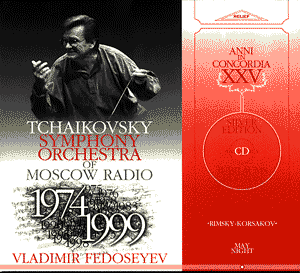Rimsky-Korsakov
provides the link between the earlier Russian ‘nationalist’ composers,
Glinka, Moussorgsky and Borodin, and the masters of the 20th
century. He left a naval career and taught composition and was
to devote much of his time to the work of others, especially their
operas. He completed, orchestrated or produced performing editions,
of what we now consider seminal works of the Russian repertoire;
the two Glinka operas, Boris, Khovantschina and Prince Igor. During
this period he also wrote his first opera and went on to write
fifteen in all. Although he was of the ‘nationalist’ camp he did
not follow the pattern of historical, often episodic, works. Instead,
as his inspiration, Rimsky chose the origin of most of his operatic
works in Russian folk tales.
The
libretto of May Night, Rimsky’s second opera, derives from a fairy
tale by Gogol. It tells the story of the love of Levko and Hanna
who plan to marry despite opposition from his father, The Governor.
Levko tells Hanna the legend of the girl who drowned herself to
escape her stepmother and became a ‘rusalka’ (east European version
of a ‘mermaid’). However, the stepmother also drowned and now
cannot be distinguished from the ‘good’ rusalki. Later Levko finds
his father serenading Hanna and complications arise at a drinking
party of the Mayor leading to the sister-in-law being mistaken
for the devil and nearly burned alive. Retreating to the tranquillity
of the lake Levko sings in praise of Hanna. The rusalki appear,
ensure that the Governor is outwitted and a happy ending ensues.
As
in the composer’s well known Scheherazade, colourful settings
suited Rimsky’s compositional technique. In May Night the orchestra
is a major protagonist in conveying the magical atmosphere. This
is heard to good effect in the Overture (CD1 tr.1) and the music
of the rusalki in Act 3 (CD2 tr.5) where the imagery in the orchestra,
aided by the sensitive chorus, conveys the atmosphere to perfection.
In this recording the performance of both the orchestra and the
choir is enhanced by a well balanced airy recording and by the
sensitively paced and phrased, conducting of Vladimir Fedoseyev.
Of
the soloists only Anna Matiushina as the sister-in-law leaves
something to be desired being rather squally at times with the
voice spreading under pressure. The Levko of Konstantin Lissovsky
exhibits a true tenor with open lyric tone and good range of expression
(CD1 tr.3). In the rusalki scene (CD2 tr.4) he is tuneful and
sensitive although his legato is not perfectly held. Perhaps a
more honeyed head voice would have helped. He is rather husky
at this point. As Hanna, Liudmilla Sapyeghina sings with a clear,
pure-toned lyric soprano allied to a good range of colours within
the voice. She brings these attributes together to provide an
expressive and convincing portrayal. As the inappropriate older
suitor, the veteran bass Aleksej Krivchenko is superb in the lower
reaches of the voice. His characterisation via vocal nuance and
inflection, as well as good diction, allows a near definitive
portrayal (CD1 tr.8) only marred by the upper reaches of his voice,
which are a little threadbare. As Kalenik, the baritone of Ivan
Budrin is sonorous if a little throaty (CD1 tr.11) whilst the
Distiller has a good range albeit with a touch of harshness in
the tone (CD1 tr.10).
In
reviewing various of these ‘Relief’ label issues of Russian operatic
works, some being the only available recordings in the UK, I have
expressed frustration about the lack of information in the booklet
and poor presentation of what is provided. I regret my criticisms
continue here. The booklet provides a full libretto in ‘Roman’
form Russian (as distinct from Cyrillic) with no translation or
even track points. The track listings are given in the same form
on the inside face of the folding slipcase. The booklet provides
artist profiles, and, joy of joy, a track-related synopsis, all
in three languages. But this too is compromised, with the numbering
for ‘CD 2’ being given as 12-25 to follow on from the 1-11 for
‘CD 1’. Needless to say it doesn’t make following the track listings
easy … to say the least! My searches through the booklet, and
slipcase cover, did not reveal any recording dates or venues.
I did however discover the cast list, in minute print, below the
track listing on an inner face of the folding slipcase.
The
Gergiev series of recordings of Russian opera on the Philips label
provides insight into some other of Rimsky’s operas, but to the
best of my knowledge this is the first issue of a legitimate commercial
recording of this work outside the former USSR. We are fortunate
that the performance and recording allow the listener to enjoy
its atmosphere and compositional pleasures to the full. For any
future issues I hope that the associated information will be of
a similar nature and quality as that provided by Philips for Gergiev’s
interpretations. This, and the other performances in this series,
deserves no less.
Robert
J Farr
Michael Dailey wites
in:
The Relief recording
is not the first one out of Russia.
I have one on Le Chant du Monde, one
on Vanguard and the same one you reviewed
on Deutsche Grammophon. It was originally
recorded on Melodiya in 1971.
